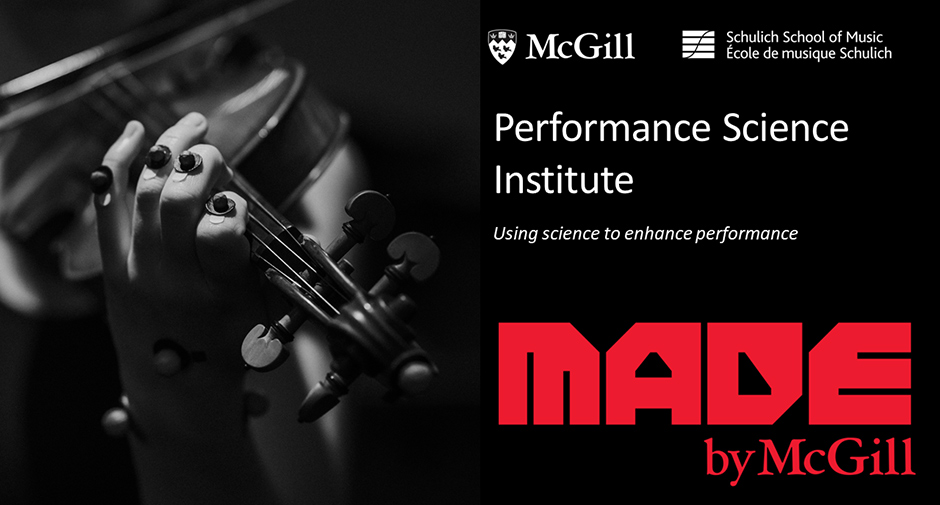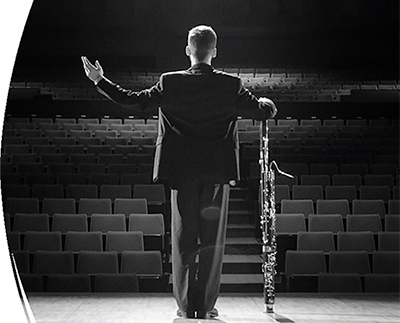
Our Mission
To capture, measure and understand performance through interdisciplinary research in order to transform the training of performers and expand knowledge of performance in the arts,sciences, business and society.
The grand challenges in performance
|
Performance education |
The challenge The conditions under which people perform are very often different from those in which they learn. This stems, in part, from a gap in training: not only do performers require knowledge, but they need to be able to apply their knowledge to perform well. |
|---|---|
|
Performance health and wellbeing |
The challenge Performance is dynamic and brings many rewards, but there are also challenges, real and perceived, that may lead to patterns of negative thinking, avoidance behavior, and debilitating injury that have serious consequences for success and for health. |
|
Performance systems |
The challenge Performances result from a vast interaction of decisions and behaviors, each altered by the qualities and interactions of those performing, as well as the environments and conditions under which performance occurs. Audiences and spectators often see only the surface of performance, not the innumerable factors and preparation underpinning it. Capturing and measuring such facets can yield considerable and sometimes surprising insight into fundamental processes of human cognition, behavior, and social interaction |
Why a Performance Institute?
- By researching the physical, psychological and emotional factors that lead to enhanced performance, we can optimize the training of injury-free, resilient, elite performers.
- These discoveries will impact our understanding of successful, healthy performance in fields ranging from business to arts to medicine.
What makes the Performance Science Institute unique?

Innovation: This will be the only institute in North America to systematically couple research and performance practice
Leadership: The Institute will be a world leader in using science to enhance the training of elite musicians
Transformation: The Institute will revolutionize our understanding of performance and its impact on health and wellbeing
Collaboration: Challenge-led research will engage interdisciplinary partners from sports science, medicine, psychology and bioengineering
Impact: The Institute will place McGill at the forefront of the emerging discipline of performance science
Pillars of the Performance Science Institute
Grounding interdisciplinary research in performance practice
- Investigate the characteristics of performance using biofeedback measurements, virtual reality tools, eye-trackers and surface EMG systems, hearing and voice screening kits and video and audio recording equipment
Sharing knowledge about healthy and successful performance
- Engage with community organizations to impact wellbeing through positive performance strategies
- Disseminate research findings through workshops, international symposia, publications and media
Using research outcomes to enhance performance training
- Apply research findings to the training of elite performers
- Transfer learning between performance disciplines
- Create graduate programs in performance science to train the next generation of leaders
The Schulich School of Music has what it takes

Performance
- This will be the only institute in North America to systematically couple research and performance practice
Research
- The Institute will be a world leader in using science to enhance the training of elite musicians
Partners
- The Institute will revolutionize our understanding of performance and its impact on health and wellbeing
With your support we can realize our vision
-
Cutting-edge equipment to collect physiological and psychological data in real time
-
Scholarships, fellowships and bursaries to attract and support outstanding graduate students
-
Chair in Performance Psychology to lead research into performance motivation, perception and resilience
-
Expert wellness practitioner team to provide programs and services to performance students
-
Outreach funding to enable knowledge transfer through workshops, symposia, and social engagement
-
Resident performer program to stimulate exchange with professionals from acrobats to surgeons
-
Infrastructure to create research-equipped practice, rehearsal and teaching studios to study performance
Timeline
![]() 2020: Engage leading international performance science expert Aaron Williamon and establish Performance Science Steering Committee
2020: Engage leading international performance science expert Aaron Williamon and establish Performance Science Steering Committee
![]() 2021: Launch preliminary research projects, create the performance simulation lab, host the International Symposium on Performance Science
2021: Launch preliminary research projects, create the performance simulation lab, host the International Symposium on Performance Science
![]() 2022: Hire the inaugural Director to develop the Performance Science Institute
2022: Hire the inaugural Director to develop the Performance Science Institute
Next Steps
-
Grow research activities, invest in state-of-the-art equipment, and engage local and international partners
-
Establish the pedagogical program to apply research findings to performance training
-
Launch graduate programs in performance science
-
Redevelop the East Wing of the Strathcona Music Building to create purpose-designed research and training facilities for the study of performance





